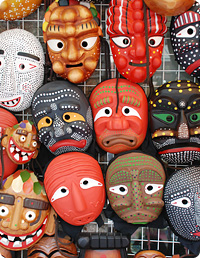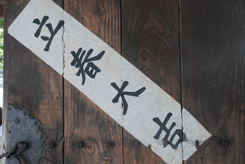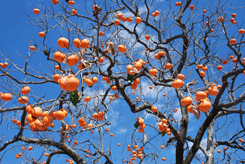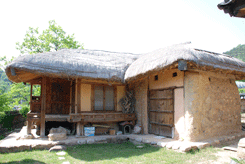Life
Non-verbal behavior
In Korea, any amount of physical contact with people other than close friends is regarded as a sign of crudeness and poor breeding. The traditional bow has given way to the handshake, but that is as far as it goes. Friendly backslap or arm squeezing are considered rude here, and the ultimate taboo is touching a person's head. Koreans meeting for the first time introduce themselves only at the invitation of a third party. The formal ritual of introduction is similar to this; the person who knows everyone in the group invites his friends to introduce themselves. One says, "I am meeting you first time." The other repeats the same sentence, and the elder suggests that they introduce themselves. Following are some of the examples that you can find the difference in culture, some of which are now disappearing. Most Korean people do not look into an acquaintance's eyes, and avoid eye contact as it is generally considered invasive. Many Koreans are open towards the option of walking arm in arm. You will see very often male friends and female friends walking affectionately arm in arm. This is in no way an indication of their sexual preference. Koreans never write the names in red ink as the color means death. The more important thing you will need to keep in mind in Korea is the word YES. "Yes" is often used simply to acknowledge what is said by one's counterpart; it does not necessarily mean one is in agreement. One is that I am listening to you and the other one is Yes, I agree with you or I will do that. They mind the counterpart and do not want to hurt the other's feeling by saying No. Koreans see their guests off to the gate and stay there until their guests are gone. Do not eat or drink without offering your food or beverage to your colleagues and ask your Korean guest more than once to help himself or herself to more food and drinks. Most Koreans love to sing at meetings or parties usually accompanied with alcohol drinks. Do prepare at least one or more of your favorite songs. Remember you do not say "I do not drink." It is polite to say, I am not feeling very well today, when you are asked to drink.
It's all right
Foreigners are often puzzled by Koreans who smile by way of apology and Koreans who say "It's all right" after causing others unintentional damage. For example, if a waitress spilt beverage or food and stained the customers' dress, she would hasten to wipe it and say, with her best smile. "It's all right." And the foreigner might get mad, because it does not seem all right to him at all and he thinks the waitress is minimizing her fault. Her smile could even make her look brazen. However, the waitress is just offering her sympathy and consolation, and hoping that the customer would think lightly of the misfortune. Most Korean guest would respond by saying "Oh, sure, don't worry." It behaves a Korean to be magnanimous to those inferior to one in social standing. Less magnanimous patrons might vent their anger on the unfortunate waitress, but no Korean can actually demand material compensation-such as dry-cleaning expense-from the poor waitress without earning the strong disapproval of everyone present. Such thing can certainly be exasperating. But Korea may be a much less attractive country the day when customers don't feel compelled to be magnanimous to waitresses.
Honorific Words
There are basically three forms of speaking in Korean language. Speaking up, speaking even and speaking down for the same word. It is very important to use the right word. To the elders or those you meet first time or younger than you, it is most recommendable to speak up. For example, the word Go, in up form is Gasipsiyo or Gaseyo, in even form is Ga, or Gara, and in down the same with even. Come in honorific form is Osipsiyo, or Oseyo, in even form is Ora, or Wa.
Name
The name is given both verbally and in written form with the family name first and the given name next. The given name usually consists of two parts, with some occasional exception. Westerners have great difficulty distinguishing male and female names in Korean as there is no sex differentiation. But, for Koreans, we have the same difficulty distinguishing a westerner's first and last name. In Korea, married women keep their family name and do not change to their husband's surname.
Title
There is no term which is equivalent to sir or madam in Korean. So you address people by titles which are given after the person's name. Though not true, the word Seonsaengnim or teacher is the most common for the calling man such as Park Seonsaengnim or Kim Seonsaeng. Yeosanim or Yeosa used to be quite common for married old women, but these days Samonim, literally meaning Seonsaengnim's wife, is more frequently used. As soon as you get married you are an Ajumma. But some younger wives may be insulted at being called this. Typically, an Ajumma is an older woman who has short permed hair. These days a lot of women are insulted when people call them Ajumma as they do not want to think of themselves as being old. In fact, there is another term for married women who still look young, hot and single. The term is called Missyjok. Jok is a classification which loosely translated as clan or tribe. Ajeossi is older Korean man, but all adult males can be called Ajeossi, which is a term for uncle. You will use Ajeossi to address taxi drivers. Oppa is what a younger sister would call an older brother. This term as well could be used when flirting, depending on intonation. Many hostess bar girls call their clients Oppa, while batting their eyelashes and trying to look cute. You could not call a waiter Oppa, or he might think you are flirting. Nuna is how a younger brother would typically call his older sister, but sometimes boytoys will call their older girlfriends Noona in an affectionately teasing way. Eonni is what a younger woman calls an older sister or an older female friend. You also call waitresses and shop keepers Eonni to get their attention. If they are obviously old and married, you can call them Ajumma and it is an upscale place you may want to address someone Ajumeoni - an even more polite honorable way of saying Ajumma.
Ppali Ppali
A highly competitive society, have created what the locals call a Ppali Ppali, literally, 'hurry, hurry' or me first, culture in which people sometimes feel they have no choice but to act selfishly to get what they need. But, Koreans do adhere to rules of etiquette.
Business Card
Koreans are fond of exchanging cards when they meet somebody new. It is a potential minefield requiring meticulous negotiation. Upon receipt of a business card, examine it, muse upon it, and treat it with reverence. The custom here is to present your card using two hands and inspect any card you receive. Never put the card straight into your wallet or purse without so much as a second glance and do not toss idly aside. In Korea, treatment of business card equals treatment of person. Never write on someone's card in their presence. Writing a name in red ink is a No!
Gibun
Gibun can be roughly translated as a personal feeling, mood or state of mind. Intrinsic to Korean culture is social harmony, in other words keeping the Gibun of others positive and intact. Examples of hurting someone's Gibun might be not turning up to a meeting on time, or perhaps shouting at a person of seniority. One must attempt to weigh up the other's Gibun, the other's state of mind.
Jeong
It refers to a deep feeling of affection and connection to another. And it is a form of trust or enduing bond developed over time between individuals, parents and their children, boss and employee, friends - and among Koreans collectively. Jeong is a unique emotional bond between Koreans and a very particular sentimental attitude that is without equivalence in other countries of the world. It is unique to Korea. It is difficult to translate into English because it is a special one that goes beyond mere affection and loyalty. People who share Jeong will demonstrate a certain degree of loyalty and consideration to one another and make sacrifices for their partners in Jeong if necessary. Acts of kindness or honesty are often explained by saying the person who performs them 'has Jeong'.
Han
It is a long-held, pent up emotion and frustrations of an individual, perhaps it is unique or so it is believed to Koreans and that underpins a lot of the culture and daily interaction. It is roughly defined as a mix of profound sorrow and simmering resentment over the suffering and injustice that everyday life sometimes piles on people, and which has characterized so much of Korea's history. This might sound like a horribly morbid feeling, but it's somewhat bittersweet, tempered by a healthy stoicism and grim determination to endure any misfortunes. Han is evident in much of Korea's art, especially its poetry, music, and film where themes of despair and retribution.
Nunchi
Nunchi, literally "eye measure", is the ability to infer meaning from unspoken messages or accurately gauge a sitation for what it is and to act in the appropriate manner and centers on assessing another's mood or Gibun in order to preserve and compliment it. Essentially, Nunchi is reading between the lines, gauging body language and tone of voice in order to figure out what the other is really saying. Nunchi or reading a person is of central importance to the dynamics of interpersonal relationships in Korean culture. It can be seen as the embodiment of skills necessary to communicate effectively in Korea's high context culture.
Chemyeon
Particularly, Korean concept of "face" is an integral to a Korean's sense of identity, and the awareness of another's Chemyeon, or the need to maintain one's own Chemyeon will often dictate the politeness of another. To protect their own Chemyeon or that of another, Koreans will avoid confrontation or embarrassment in many ways or are not being overzealous or overeager.
Man and Woman
Sons are definitely preferred over daughters, since sons carry on the family line and are expected to look after the parents in their older days. When addressing a formal audience, making a speech, etc., it always begins with Gentlemen and ladies. Age is highly respected and important as such in the use of the words. Meals are served first to the elders and children the last. When indicating everybody, the order is always man and woman, and the old and the young.
Good bye
Basically, two different expressions are mostly used when leaving each other. One is Annyeonghi Gasipsiyo, which is spoken by the person staying wherever at home, office or hotel to the person leaving. The other one is Annyeonghi Gyesipsiyo, which is spoken by the person leaving to the person staying. Both mean good bye though they include much more than good bye in Korean society, i.e, please go in peace and please stay in peace. Bowing is considered to be polite. However, increasingly children are taught to wave their hand sideways and say bye-bye in English.
Gestures
The arm should be downward with the palm facing downward. Fingers should be moved with the palm downward. The other way of waving is considered derogatory and is the gesture for the dog or pets.
Meal course
Soup and main dishes are served all at once along with side dishes. Dessert is not served automatically, but when it is, it is usually seasonal fruits. The menu is printed on signs on the wall, rather than given out individually.
Bill for the meal
Now is the dying out custom, but one person usually pays for all. Many a good natured tussle takes place in front of the cashier as each person vies to pay the bill.
Blow nose
People if they must blow their nose will turn around but, generally speaking, to blow your nose in front of others is regarded as bad manners. Paper tissue is used and always thrown away, never placed into a pocket.
Address
In Korea, the order of address components is exactly in the opposite order with that of the western countries. Address is written starting with the larger units such as country or province, city, district, and then the street, number etc. followed by the person's name, while for the other western countries, it is almost always written beginning with the person's name first, then street, city, province or state and country. Do not ever try to take taxi with just the address. Streets are not generally named. Better know the significant landmarks like the post office, police box, theaters, markets, railway stations, bridges, school and ward offices or other likes. Houses are numbered, but they are intended only for postmen.
Cooking
Korean recipe books are now widely published, but they are not common by any means. New and experienced cooks learn by watching another person actually preparing or by verbal instruction. Often cooked by the written recipe, but instruction is preferred.
Money counting
Bills are held in left hand and the left thumb slides each bill to the right so that the thumb and forefinger of the right hand can flip the bill toward the persons holding the bills. Money is kept in the hands until the required amount is counted out.
Wedding and funerals
Weddings are mostly held in rented wedding halls and very occasionally in churches. The groom wears western style suit, but wears white gloves at the wedding ceremony. Funerals are conducted in the home, hospital, or rented funeral parlors. Celebrities like their professors, priests and public officers are among the popular ceremony leaders.
Directions
When indicating the direction, the order is always fixed as East, West, South and North.
Age
Korean age is always one year older than western age though they are born in the same year. Every Korean ages one year when they are born as all the Koreans consider almost a year in their mothers. Thus, at the time of their first birthdays, they are already one-year old. In Confucianism, age brings wisdom. Hence, the older you are, the more advises you are allowed to dole out to your juniors.
Shoes off
When visiting Korean home, always keep in mind that shoes should be taken off before entering the house or apartment. Also, make sure you remember this before entering the temple halls or some of the restaurants.
Shopping
It is not wise or recommendable to step into the shop early in the morning without buying anything. But, it is quite okay after mid-morning. No refund early in the morning is recommendable.
White gloves
Koreans often wear their white gloves on wedding or driving. It is a kind of tradition. White masked drivers can often be seen. Today, more colorful masks have replaced them. When Koreans catch a cold or a flu, it is very common to wear mask both at home and work.
The possessive, my and our
Most of Koreans love to say the possessive Our. We say our school, our mother, our country, our village, our home, our car, our company, our teacher and so on. When indicating a purely personal belongs, then we occasionally say My. My room, my computer, my book, my clothes, my watch and my cell phone, etc. But, Koreans still prefer to say 'Our' in most cases.
Drinking code
You will notice several things unique when you step into Korean pubs or liquor salons. Korean beer bottle comes mostly in 640 milliliter bottles, which is most likely intended to be shared. Smaller bottles are available though. Koreans rarely, if ever, go to restaurants and pubs alone. Most of the time, Koreans go in group of threes or fours. Lone diners are not welcomed by the restaurants during the busy hours. The other odd custom to the foreign eyes is that there is no practice of having unfinished bottles kept in the pub or salon. This is neither because Koreans do not trust the liquor establishment nor because Korean liquors are cheap. It is solely because Koreans, drinking in company, do not think their mirth is complete until everybody had more than enough. The charge of crudeness and incontinence can be leveled with some justice at this practice, but there is also an element of wisdom in it. By indulging in drunken mirth and forgetting rational restraint, Koreans have been able to relieve themselves of tension, anxiety, and various daily grievances and displeasure, which made it possible for them to bear the burden of life more lightly.
Urban legend
The green frog's croaking bodes rain.
If your rose balsam nails are still orange by the time the first snow falls, you will marry your first love.
If the bride smiles at her wedding ceremony, she will give birth to daughter.
If you sleep in a room with a fan on, you might die.
Dreaming of pigs is good luck, dreaming of dogs is bad luck.
Don't blow a whistle at night or snakes will come.
Shake your leg and you shake out the luck.
Rest room (Hwajangsil)
Ajar doors are rarity in Korea, except some fancy hotels or office buildings. They are mostly closed. Do not be embarrassed to see all doors shut. Knocking is the answer. Do not try them in the small buildings or business establishments in busy districts like markets or likes as most doors are locked. A personal key is given to those staying in those buildings. Pay toilet is not available in Korea.
Tips
Although it is not customary, USD 1 for room maid a day and USD 2 for bell hops, are quite recommendable. Most of hotels and local restaurants do not expect tips. However, it is definitely at your discretion.
Zodiacs
In the orient the zodiac represents a twelve-year cycle with each year dominated by an animal, one of them imaginary: rat, ox, tiger, rabbit, dragon, snake, horse, sheep, monkey, cock, dog and pig. The day is divided into twelve two-hour periods. Each period has the characteristics of an animal in the zodiac cycle. It is tremendously important to record the hour of birth, for from it all future significant calculations are made. To be born in a certain hour determines one's future fortune and suitable marriage partner. The twelve animals are the symbols of the Twelve Terrestrial Branches, which is part of the cycle of sixty that forms the basis of the lunar calendar. Though the lunar calendar was developed in China, supposedly 2637 B.C. by the legendary Emperor Huang-Ti, some scholars believe that the twelve animals were borrowed from the Turks. Needless to say, the oriental zodiac has been in use since around the time of the Christ. The animals of the zodiac and the characteristics of those born under them are:
Rat (23:00-01:00)
Timid, humble, energetic, ambitious, quick to anger, stingy, perseverant, and gossipy, penny pinching toward others.
(A happy time, will love others).
Rat years are 1912, 1924, 1936, 1948, 1960, 1972, 1984, 1996. 2008
Ox (01:00-03:00)
Strong, steady, patient, hard working, dexterous, quiet, placid, easygoing, stubborn, success oriented, and eccentric. (Unhappy time to be born)
Ox years are 1913, 1925, 1937, 1949, 1961, 1973, 1985, 1997, 2009
Tiger (03:00-05:00)
Sensitive, stubborn, short-tempered, speculative, sympathetic, courageous, headstrong, prone to selfishness and a bit mean and obstinate, not a decision maker. (Will be powerful. may have some physical defect such as tumor. Such tumor is a blessing).
Tiger years are 1914, 1926, 1938, 1950, 1962, 1974, 1986, 1998, 2010
Rabbit (05:00-07:00)
Good-natured, placid, affectionate, friendly, melancholic, reserved, virtuous, talented, and complacent (Unlucky, will likely fail in life)
Rabbit years are 1915, 1927, 1939, 1951, 1963, 1975, 1987, 1999, 2011
Dragon (07:00-09:00)
Quick, excitable, short-tempered, stubborn, energetic, honest, sensitive, brave and trust inspiring. (Will be powerful)
Dragon years are 1916, 1928, 1940, 1952, 1964, 1976, 1988, 2000, 2012
Snake (09:00-11:00)
Intelligent, attractive, quiet, pensive, vain, passionate, determined, and somewhat crafty and antagonistic (Will be clever, a good student)
Snake years are 1905, 1917, 1929, 1941, 1953, 1965, 1977, 1989, 2001, 2013
Horse (11:00-13:00)
Quick, impatient, hot-blooded, quick to anger, independent, and perceptive.
(Best hour to be born, will have the blessings of heaven whether a boy or a girl)
Horse years are 1906, 1918, 1930, 1942, 1954, 1966, 1978, 1990, 2002, 2014
Sheep (13:00-15:00)
Artistic, tender, kind, timid, generous, sympathetic, and unassertive.
(Will be restless and a wanderer)
Sheep years are 1907, 1919, 1931, 1943, 1955, 1967, 1979, 1991
Monkey (15:00-17:00)
Passionate, strong-willed, clever, skillful, financially adroit, and contemptuous.
(Will be unlucky and lead a lonely life)
Monkey years are 1908, 1920, 1932, 1944, 1956, 1968, 1980, 1992
Cock (17:00-19:00)
Pensive, ambitious but without foresight, brave, outspoken and often improvident.
(Will be clever and write well)
Cock years are 1909, 1921, 1933, 1945, 1957, 1969, 1981, 1993
Dog (19:0-21:00)
Honest, loyal, confidence-inspiring, eccentric, cold emotionally, and can be selfish, stubborn and critical.
(Will be unhappy and have scars on the body)
Dog years are 1910, 1922, 1934, 1946, 1958, 1970, 1982, 1994
Pig (21:00-23:00)
Honest, chivalrous, gallant, affectionate, kind, studious, short-tempered and impulsive.
(Will have a long life and happiness)
Pig years are 1911, 1923, 1935, 1947, 1959, 1971, 1983, 1995.
Certain years such as the white horse year, are believed to be bad years for girls. Koreans tend to feel less strongly about this, but it is still considered unlucky and somewhat unfortunate to have a baby girl born in this year. A man's vocation or a woman's marriage as well as many other important decisions of life are influenced by the geomancer's interpretation of the zodiac by the month, day, hour and even minutes.









